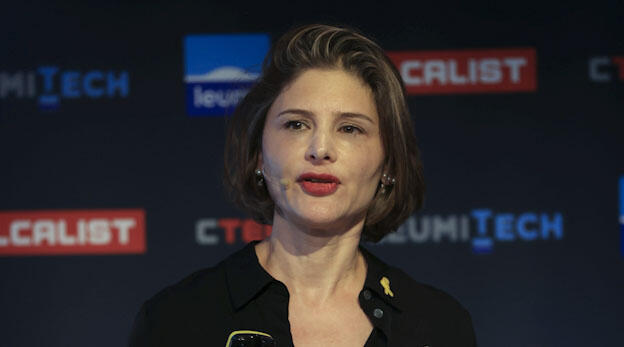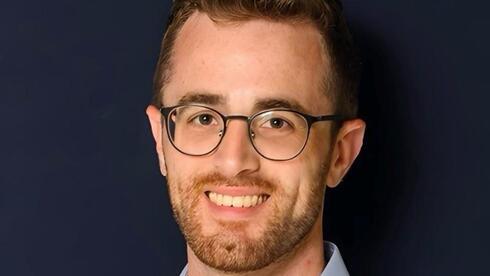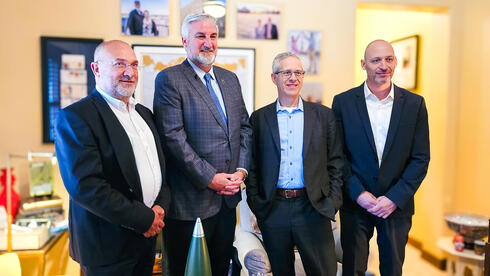
Mind the Tech NY 2024
"Israeli technology companies have a tremendous advantage in a chaotic environment"
Dina Pasca-Raz, Head of Technology at KPMG Israel, spoke at Calcalist and Bank Leumi’s Mind the Tech conference in New York. "As uncertainty increases and threats are more tangible than ever, the need to ensure stability and continuity creates demand for a variety of tools and measures that will require innovation"
Dina Pasca-Raz
(Elad Gershgoren, Tomerico)
"As the uncertainty increases and the threats are more tangible than ever, the need to ensure stability and continuity increases. This creates demand for a variety of tools and measures that will require innovation,” said Dina Pasca-Raz, Partner and Head of Technology at KPMG Israel, at the Calcalist and Bank Leumi’s Mind the Tech conference in New York.
In her remarks, Pasca-Raz referred to the global and local events of recent years, namely the pandemic, the disruptions in the supply chain, the Russian invasion of Ukraine and the October 7 attack. "It's no longer one black swan, it's a whole flock," she said. "But if uncertainty is the only certainty and despair is not a plan of action, what can we still say about the future? How do we prepare for it?
"There are two interesting answers. First, instead of talking about change, we will talk about what will remain constant. In a changing world, we will talk about what is expected not to change, no matter how innovative the technology and how extreme the weather. Morgan Housel claims that the only thing that remains constant over time is human nature, and the only way to deal with a chaotic and unpredictable future is to focus on human needs. Think Meta, Google and Amazon, Uber, Netflix and Apple. Their business model is based on meeting basic human needs and urges - communication, social approval, movement in space, curiosity, entertainment, and satisfying our lust for more and more objects, preferably beautiful and cool - all with minimal effort and discomfort.
"The same principle is also valid in relation to the business world - the need to create value, control and monitor, the need to create a competitive advantage or protection against a competitive threat - these are needs that will continue to be relevant and keep us busy, no matter how many black swans decide to drop by for a visit.
"To all of these we must add one more, which we can guess that the demand for will not lessen in the foreseeable future - our need to feel safe - first and foremost in our home but also in the physical and virtual spaces in which we roam and operate. As individuals and as organizations we are exposed to a variety of physical dangers, as well as cyber threats, fake news, identity theft, invasion of privacy and disinformation.
"And as the uncertainty increases and the threats are more tangible than ever, the need to ensure stability and continuity creates demand for a variety of tools and measures that will require innovation. Companies that build their business model on this need will have a higher chance of success, subject of course to effective execution. This naturally brings me to the next subject we'll talk about: strategy and tactics. Recently, it seems to me that when you tell someone that their thinking is 'tactical', you actually mean to insult them, but politely of course. But in a world where the horizon of strategy and the range of forecasting are constantly shortening, tactical excellence and successful execution may be just as important and decisive and maybe even more than strategy.
"Indeed, in the terrible days that befell us in Israel after October 7th, technology entrepreneurs and leaders in the business community in Israel did exactly that - they focused on tactics and execution. No one sat down to 'build a strategy'. There was no time or bandwidth. What happened is that a broad group of people rolled up their sleeves and tried to respond to the basic needs of the people and of the business or civil systems with the goal that they would continue to function simply because there was no other choice. Daily situation assessments, sometimes more than once a day, in relation to the functioning of essential systems, diversion of resources between the various centers, responding to the physical and mental upheaval of employees, proactive communication with concerned investors and regular updates on the situation, leveraging the solidarity and desire to help on the part of the business community in the U.S. and many European countries, and at the same time trying to focus on absolute necessity - the core of the venture - social or business, with no frills.
"And this is what the successful technology companies in Israel are doing these days, they focus and refine their product so that it meets a real need or pain, they produce a clear and visible advantage or savings, a must have instead of a nice to have. They save where possible, and value the runaway at the same time for continued investment in the development and improvement of products and sustainable growth in the relevant markets. Actually, when you think about it - Israeli technology companies have a tremendous advantage in a chaotic and complex environment like the one we are currently experiencing: they are born and grow with an adaptive and flexible DNA that prefers tactical solutions, they are used to an emergency situation and they become global almost from inception. In addition, in recent months the Israeli technological ecosystem has shown extraordinary resilience and its ability to support not only itself, but also to play an essential social role in the face of the enormous challenges that have been placed before it, because of all these, it seems to me that now especially is a wonderful time to invest in Israeli high-tech."
You can watch her full remarks in the video above.
















